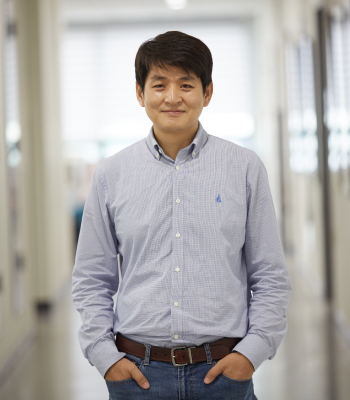mainmenu
Social Neuroscience Group
The goal of social neuroscience group is to understand how the brain controls emotion and cognition in the context of social behavior, and how maladaptive changes in brain circuits relate to various psychiatric disorders such as autisms and psychopaths.
Our research focuses on 1) the neural mechanisms of empathic ability to share and understand the emotions of others, 2) individual recognition and memory formation to understand conspecifics others, 3) development of novel empathy models and brain rhythms, and 4) structure and function of glycosylation enzymes and glycans involved in social behavior and mental disorders, which has been unexplored so far. Focusing on the neurobiological mechanisms of comprehensive brain activities underlying these social behaviors, our group will identify mechanisms of the cognition and sociality at the levels of spanning from molecules to systems. These studies will contribute to the understanding of the brain mechanisms for social cognition in humans, which will ultimately benefit the treatment of mental disorders.
- 1. Emotional salience driving empathy of negative affection
- 2. Brain rhythmic oscillation in affective empathy
- 3. Behavioral paradigm for studying empathy of positive affection
Empathy, Genetics, Phospholipase C beta-1, Rhythmic oscillation, Theta rhythm, Anterior cingulate cortex, Amygdala, Attention
- Neural circuits underlying a psychotherapeutic regimen for fear disorders, Nature, 2019
- A missense variant at the Nrxn3 locus enhances empathy fear in the mouse, Neuron, 2018
- Mice in conflict show rule-observance behavior enhancing long-term benefit, Nature Communications, 2017
- Observational fear learning involves affective pain system and Cav1.2 Ca2+ channels in ACC, Nature Neuroscience, 2010
- 2018-2022 Chair, Organizing Committee, Keystone Symposium on Neurocircuitry of Social Behavior
- 2012-2020 Director, Center for Cognition and Sociality, IBS
- 2005-2011 Director, Center for Neural Science, KIST
- 1991-2001 Associate Professor/Professor, Dept. Life Science, POSTECH
- 1985-1991 Assistant Professor, Dept. of Biology, MIT
- 2005 MOST, Korea
- 2004 Order of Civil Merit (Dongbaeg), President of Korea
- 2004 Hoam Prize, Hoam Foundation
- 2021 Fellow, International Union of Physiological Sciences(IUPS) Academy of Physiology
- 2021 Francine Shapiro Award-2020, EMDR-Europe Society
- 2018 AAAS Fellow, American Association for Advancement of Science
- 2010 Member, National Academy of Sciences, Republic of Korea
- 2009 Foreign Member, National Academy of Science, USA
Glycosylation is a common posttranslational modification, in which a carbohydrate consisting of several sugar molecules, which is sometimes also referred to as a glycan is attached to a protein, lipid, or glycan substrate. Nearly 2% of the human genome encodes glycosyltransferases, glycosidases, or other glycan-modifying enzymes, and approximately half of all mammalian proteins are glycosylated, suggesting the importance of glycosylation in cellular function. The glycan structures on glycoproteins expressed in the central nervous system (CNS) play key roles in regulating cellular recognition, adhesion, signal transduction and trafficking that are important for normal brain function. More importantly, differential glycan expression has been found at multiple stages of CNS cellular differentiation and in diseases and pathological conditions such as Alzheimer’s disease, Parkinson’s disease, Huntington’s disease, multiple sclerosis, schizophrenia and brain cancer.
However, the roles of glycan structural alterations in glycoproteins and the functions of glycoproteins in different brain regions and variable cell types, including neurons and glia, have not yet been adequately addressed, particularly as they pertain to social behaviors and neuropsychiatric disorders closely related to abnormal social behaviors. Therefore, my research group will focus on identification of the role of glycosylation in social behaviors and behaviors associated with neuropsychiatric disorders and other brain diseases and will also focus on investigation on diagnostic tools and therapeutic strategy through studies on physiological, biochemical and molecular mechanisms underlying altered protein glycosylation in different cell types including glia and neurons.
Glycosylation, Neuropsychiatic disorders, Social behaviors, Glycomics, Proteomics, Schizophrenia, PTSD, Depression, Autism
- Depression in adolescence and BDNF, Frontiers in Molecular Neuroscience, 2022
- Deletion of Phospholipase C β1 in the Thalamic Reticular Nucleus Induces Absence Seizures, Exp Neurobiol, 2022
- Positive modulation of N-methyl-D-aspartate receptors in the mPFC reduces the spontaneous recovery of fear, Mol Psychiatry, 2022
- NMDAR modulators as rapid antidepressants: Converging and distinct signaling mechanisms, Integrative Clinical Medicine, 2020
- Stress-induced changes in social dominance are scaled by AMPA-type glutamate receptor phosphorylation in the medial prefrontal cortex, Sci. Rep, 2018
- The Possible Role of Neurobeachin in Extinction of Contextual Fear Memory, Sci. Rep, 2018
- mTOR-dependent synapse formation underlies the rapid antidepressant effects of NMDA antagonists, Science, 2010
- 2021-Present Associate Professor, Basic Science, IBS campus, UST
- 2020-Present Senior Research Fellow, IBS
- 2019-2020 Associate Research Scientist, Department of Psychiatry, Yale University, USA
- 2018-2019 Postdoctoral Associate, Department of Psychiatry, Yale University, USA
- 2013-2018 Research Fellow (non-tenure track), Center for Cognition and Sociality, IBS
- 2010-2013 Postdoctoral Fellow (KRCF young scientist fellow), KIST, Korea
- 2009-2010 Postdoctoral Associate, Department of Psychiatry, Yale University, USA
- 2007-2008 Postdoctoral Researcher, Department of Neuroscience, College of Medicine, The Ohio State University, USA
- 2011-2013 Young Scientist Fellowship, Korea Research Council of Fundamental Science and Technology
- 2005-2007 Predoctoral fellowship, American Heart Association (0515170B)
- 2001-2002 Intern fellowship, Korea Science and Engineering Foundation (KOSEF)
My laboratory seeks to understand how the brain controls social affective behaviors, and how dysfunction in brain circuits relate to psychiatric disorders such as autism and psychopaths. In particular, we are interested in how the anterior cingulate cortex (ACC) integrates multiple sensory and emotional information to induce vicarious social fear and how the affective pain signal is processed in thalamic circuits in observational fear, a rodent model of affective empathy. To resolve these neural mechanisms comprehensively, we combine mouse genetics, optogenetics, and in vivo calcium imaging techniques. In addition, we aim to identify novel genes and underlying signaling pathways to probe synaptic and circuit dysfunctions that cause abnormal emotional recognition and empathic behaviors.
Social affective behavior, Empathy, Observational fear learning, Emotion recognition, Psychopathy, Psychiatric disorder
- Observational Fear Learning as A Potential Model of Affective Empathy, Neuron, 2019
- A Missense Variant at the Nrxn3 Locus Enhances Empathy Fear in the Mouse, Neuron, 2018
- Variability in empathic fear response among 11 inbred strains of mice, Genes Brain Behav, 2016
- Natural Genetic Variation of Integrin alpha L (Itgal) Modulates Ischemic Brain Injury in Stroke, PLoS Genet, 2013
- A QTL (LSq-1) on mouse chromosome 7 is linked to prevention of tissue loss following surgical hind-limb ischemia, Circulation, 2008
- 2020-Present Research fellow, IBS Associate professor, UST
- 2018-2020 Tenure-track Research Fellow, IBS
- 2013-2018 Research fellow (Non-tenure), IBS
- 2012-2013 Postdoctoral researcher, UCSF, USA
- 2010-2012 Postdoctoral researcher, Duke Univ., USA
- 2005-2010 PhD in Genetics & Genomics, Duke Univ., USA
- 2022 Merit award for basic science by the Minster of Science and ICT, Korea
- 2021 Merit award for the 10th anniversary of the institute, IBS
- 2008 American Heart Association (AHA) Pre-doctoral Fellowship
 Center for Memory and Glioscience
Center for Memory and Glioscience




 Center for Memory and Glioscience
Center for Memory and Glioscience